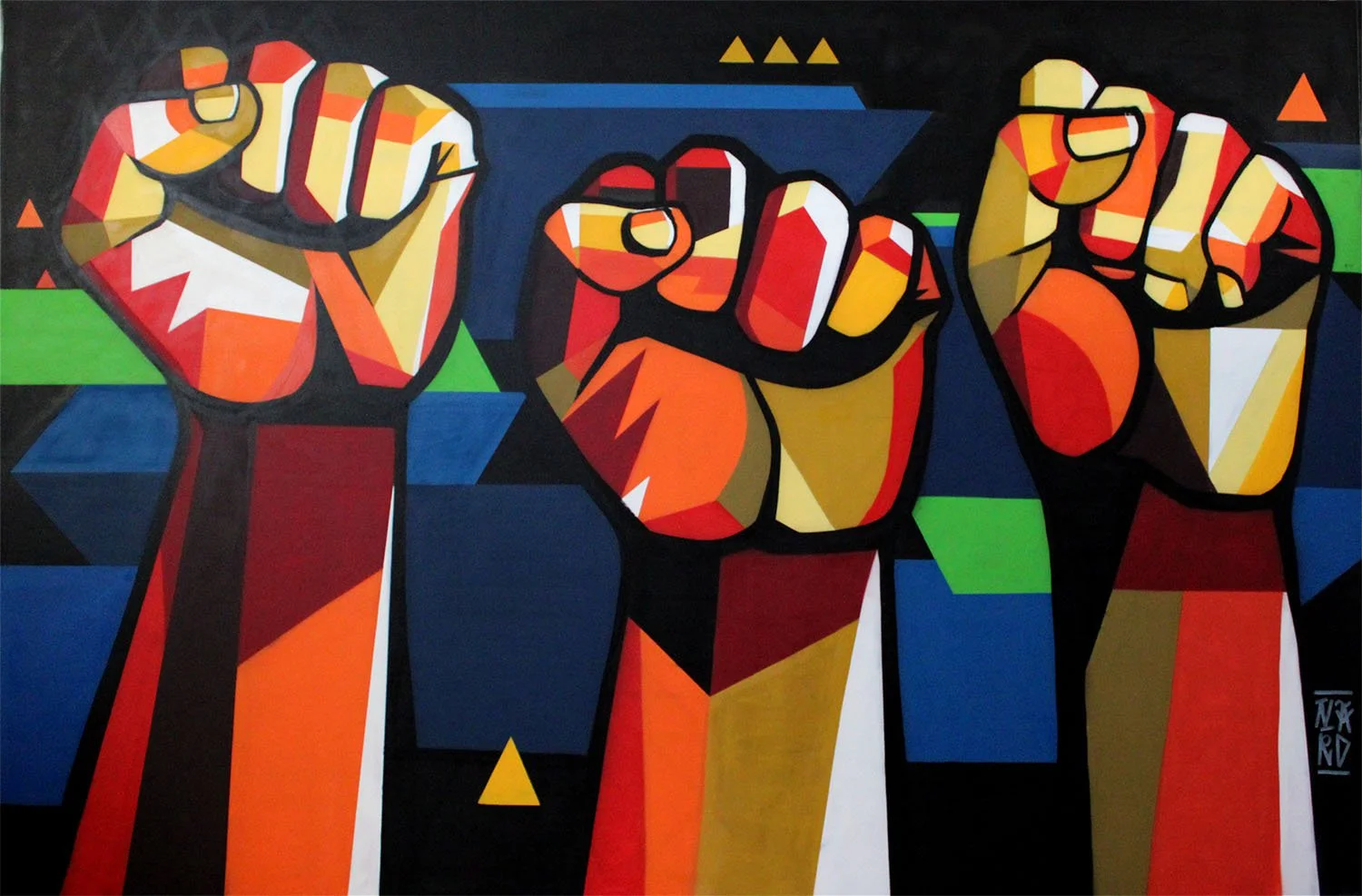September 2024
“Unity” by Cape Town based artist Nardstar*
Dear friends,
Driving down the smooth six-lane highway, I looked out my window and saw mile after mile of corrugated tin shacks along the roadside. Every so often along the way, I’d see a group of kids—likely residents of the tin homes—playing soccer in the dirt in the limited space between the highway and the shacks. I worried about the safety of these kids playing so close to a speeding highway but my attention was broken by a car passing my own vehicle. It was a slick navy blue Bentley that has a cost of over $200,000. I looked in a rearview mirror and saw there was a stylish white Mercedes-Benz. The contrast of wealth and poverty was jarring.
I had been driving the 45 minute trip from Cape Town—a place I spent several weeks this summer—to a university nestled among the South African vineyards. This stretch of land between the wealthy urban center and the wealthy wine estates is where millions live in poverty. The view I had of the Bentley alongside the shacks stood as an image of stark contrast that exists in present-day South Africa. South Africa is a place where the collectivist concept of ubuntu exists alongside an economy with the largest income inequality in the world. It is a place where one of the world's most progressive constitutions and a strong legacy of overcoming racial injustice exists alongside in-your-face racial injustices (as one example: the Bentley and Mercedes drivers were both white, and all the residents of tin homes I saw were Black).
Reckoning with these contrasts can be disorienting and they aren’t unique to South Africa. Reality in the United States does not always match the ambition of our stated values. We certainly have our own share of income inequality and racial injustice, despite our country’s narrative as a place of equal opportunity and freedom for all. It’s easy to dismiss this as pure hypocrisy by the people in power. In the face of a stark contradiction of supposed values and lived realities, burnout and jadedness can set in. While those feelings are real, it helps to be reminded that our society is constantly a work in progress. It is not statically one thing, it is dynamically many things all at once. And we—as the do-ers, leaders, and changemakers in this world—play a key role in understanding the past/present and helping to shape how our society evolves into the future.
It’s obvious that South Africa and the U.S. have a long journey to get closer to the ideals their anti-apartheid and civil rights leaders fought for. But a key mindset to hold onto is that equity & justice are not a destination. They are ideals we are always working towards . Humans, and the world we live in, are too dynamic for equity & justice to be a resting place we arrive at. They are a path, a never-ending journey, that is filled with challenges, heartache, beauty, and joy. Focusing on moving along the path towards equity & justice helps us recognize that our immediate role is to take the next step towards building a better world.
We don’t have control over everything, but we have control over the energy we bring into the world; where we spend or give our money; the relationships we build with neighbors; the narratives we promote in our networks; the votes we make up and down the ballot; and the groups we build and exercise power with. What choices will you make within our imperfect world to take those next steps towards building a better world?
Take care and take the next step,
Paul
Today’s Key Point:
Our society is always evolving and we play a role in shaping the future; we need to keep our focus on taking the next step towards making a better world possible.
Quote of the Month
“Do your little bit of good where you are; it's those little bits of good put together that overwhelm the world.” -Desmond Tutu
Today’s Reflection Questions:
What are small steps forward you’re already taking to move towards a better world? What are other steps you’re considering?
What makes you feel burnout or jaded in your work to make a better world possible? What gives you energy?
Oftentimes glimpses of justice exist within contexts of injustice. Where do you see equity & justice being practiced in your community? How can you support or help grow it?
Inspired reading/listening/viewing:
Long Walk to Freedom by Nelson Mandela
Born a Crime by Trevor Noah
“Bounded Justice and the limits of health equity.” by Melissa Creary
“South Africa’s Young Democracy Leaves Its Young Voters Disillusioned” in NYTimes
“Cultivating a Long View.” by Chris Dixon in Upping the Anti: a journal of theory and action
